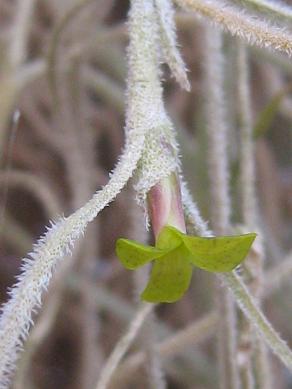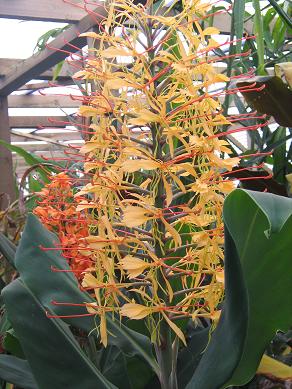JEARRARD'S HERBAL
Thats enough introduction - on with the plants!
To navigate this site, use the links above, or the detailed links at the bottom of this page.
... out in the garden.
7th September 2008
 Habenaria balfouriana .
Habenaria balfouriana .
This came to me as Habenaria davidii, so thanks to all the people who have assisted in getting an accurate
identification. I was expecting flowers with a white lip but these lime ones are a delightful
surprise.
I have been keeping it very wet through the summer as the flower spike has elongated but I am
not sure what to do with it as it starts to die back. I imagine drying it out will probably be safest
but I still have a few weeks grace before I have to make the decision.
7th September 2008
 Gladiolus flanaganii .
Gladiolus flanaganii .
The "suicide lily" grows on high cliffs in the Drakensberg, South Africa and the nickname relates to the peril associated with scaling the heights
to approach it closely. Fortunately it prospers in a pot and the scarlet flowers produce abundant seed and a ready means of increase.
There are Gladiolus species for almost every season. The spring flowering species are just bare pots at present. The summer
flowering ones (and this is a late example) are just hitting a peak, and the winter flowering species have started to push up through the soil,
as green and fresh as they ever look (it has to be admitted that many of the species have rather tired foliage by the time they flower).
7th September 2008
 Tillandsia usneoides .
Tillandsia usneoides .
The Tillandsia are as marvellous group of bromeliads. Many of the are terrifyingly tender, but the grey leaved 'aerophytic' species
seem to tolerate all sorts of stress, including low temperatures. I have been growing T.usneoides for decades, though I have lost it a few times
and had to replace it, usually as a result of keeping it too moist or too shaded which it detests. It hangs in the greenhouse and gets ignored
which seems to suit.
I have known for years that it flowers, because I find the seed capsules, but suddenly this evening I saw a tinby flash of green among the
grey stems as I walked past, and when I investigated I discovered it was scattered with tiny individual flowers.
I should try it outside really, I am sure it would prosper among the larches.
7th September 2008
 Hedychium gardnerianum 'Kalimpong' .
Hedychium gardnerianum 'Kalimpong' .
September has arrived, and the rain has flooded down, so I think we can safely assume it is autumn. Now is the time to revel in the last
sparkling burst of seasonal colour, and there is nothing that does it with the panache of the Hedychium.
I always await new flowers with building excitement, and this flower head has been growing for a couple of weeks now. I am very fond of
Hedychium gardnerianum in spite of its agressive weediness in places like the Azores and New Zealand. I console myself with the thought
that since I don't live in places like the Azores and New Zealand it doesn't really matter!
This form has pinkish stems, heavily covered in white bloom. The flowers have a rather narrow labellum but it doesn't matter when the heads are fully open.
The colour has more orange in it than is usual for the species. It isn't one of the "jump-up-nose-first" tall forms, with all the associated hazards
, nor one of the "stoop-or-get-wet-knees" low forms. The flower heads form at easy-smell height. Just perfect!
To find particular groups of plants I grow, click on the genus name in the table above. Click on the "Index" box at the top of the page for the full list.
I have a lot of good intentions when it comes to updating this site, and I try to keep a note
about what is going on, if you are interested.
If you want to contact me, the address is infoMONKEYjohnjearrard.co.uk
When typing the address in, please replace MONKEY with the more traditional @ symbol! I apologise for the tiresome performance involved, but I am getting too much
spam from automated systems as a result of having an address on the front page.
 Habenaria balfouriana .
Habenaria balfouriana . Gladiolus flanaganii .
Gladiolus flanaganii . Tillandsia usneoides .
Tillandsia usneoides . Hedychium gardnerianum 'Kalimpong' .
Hedychium gardnerianum 'Kalimpong' .